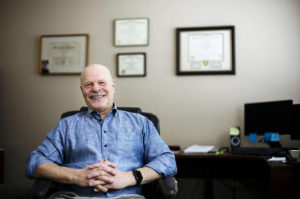Mind Springs Health Receives National Innovation Award for Phase-based Care Model
Mind Springs Health, the Western Slope’s largest mental health provider, has been awarded the 2019 Sherman Award for Excellence in Patient Engagement for its cutting-edge phase-based care program that has been shown to drastically reduce care wait times and improve patient outcomes.
The Institute for Healthcare Improvement’s Lucian Leape Institute and Taylor Healthcare established the Sherman Award in 2014 on behalf of online community and sponsor EngagingPatients.org. The award recognizes the innovative work people and organizations across the health care spectrum are doing to advance patient and family engagement. The Colorado Behavioral Health Council had already recognized Mind Springs and its phase-based model last year with the Golden Light Bulb award, which recognizes community mental health care innovation statewide.

The phase-based program was developed by Mind Spring’s chief medical officer Dr. Jules Rosen, executive vice president Michelle Hoy, quality and compliance vice president Dave Hayden and their program team. It provides timely access to intensity-appropriate treatment that adjusts dynamically according to patient needs.
Rosen said that the phase-based program’s trial run for depression at one of its clinics has seen staggering success. The program treated individuals in different stages of depression and shortened wait time to treatment from the national standard of one to three months to only four days.
“The outcome has been terrific,” Rosen said. “This is the start of something big, getting this award. It shows that we’re really on to something that can create national change.”
Rosen said that the most important elements to making phase-based care work are a massive culture change in the community mental health field, as well as using mathematical algorithms based on patient scores on the standard nine-question Patient Health Questionnaire, a form for depression assessment.
Rosen explained that the core of the culture change comes in a team-based approach to each individual patient; as opposed to the standard single-provider model that creates backlogs and scheduling delays while placing “ownership” of the patient’s care to a single individual.
In the phase-based care model, teams are formed to review patient care on a rolling basis. The team includes a patient’s prescriber, case manager, counselor and peers, who go over a patient’s PHQ score evaluation after it is fed through the algorithm, and a consensus is reached in how to best address the individual patient’s needs.
Instead of waiting the standard weeks or months before being able to see a therapist due to a shortage of providers, patients with higher risk and needs are given priority in care level and immediately put into a program. The teams then evaluate patients on a weekly basis and adjust care as needed. That includes switching between counseling, therapy and medication-assisted treatment.
“Our outcomes are frighteningly good,” Rosen said. “The national standard of recovery from depression after treatment starts, meaning when their acute episode is over, is 16% by week six and 33% by week 12. In our program, we’ve had 63% of depression patients in recovery by week six and 78% by week 12.”
Aside from giving help to the people who need it most urgently, the model also delegates lower-priority cases to alternative or less-involved therapeutic means and frees up staff and resources toward the highest-risk patients, for whom the mental health safety net is most critical. The model, Rosen said, would be a boon to the bottom lines of community mental health systems, which are usually underfunded.
However, if patient care needs change suddenly — such as with a person suffering an acute mental health episode — the model has “triage” care available on the spot to give patients the on-demand care they require.
Rosen said the phase-based model has been getting a great reception from psychiatric peers, with the model receiving interest when it was presented to the American Psychiatric Association at its 2019 annual meeting this past weekend in San Francisco. Mind Springs is looking to receive grant funding to research and develop the model for disorders aside from depression.
“We’re hoping to research this further and deploy it nationally, with the depression model ready to go,” Rosen said. “We’re looking on how to measure symptom severity in all the other disorders, such as post-traumatic stress disorder. We are making tremendous inroads with this; nobody has approached mental health in this way before. This potentially becomes a payment model for Medicaid, so that mental health centers don’t just get paid according to how many they see, but how many get better. The culture change needed is phenomenal.”
While the pioneering model is ready to lift off, Rosen will be stepping down from his position as Mind Springs CMO next month. Rosen said the move was a long time in the making in order to get away from day-to-day operations so he can focus on research and development of the phase-based model and oversee the opening of three new geriatric mental health clinics across the Western Slope.
Rosen said that he was excited to go on to carrying the phase-based care model forward with his next venture. He acknowledged that the model may not actually work out, but his dogged positivity tells him it will.
“This is a whole new approach to mental health, and we’ll see where it goes,” Rosen said. “What happens with the world doesn’t always go as planned, but I’m a pathological optimist.”